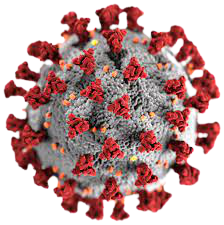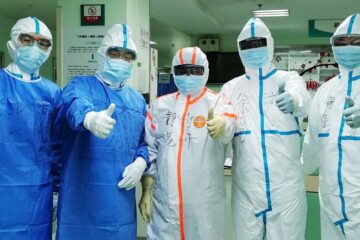PROTECT YOURSELF & OTHERS. GET VACCINATED.
MONITOR & REPORT Covid-19 Vaccine Side Effects
Step One – ASK
If the person getting vaccinated has ever had a severe allergic reaction to a vaccine
If YES, refer the person to an allergy specialist or health provider, who will recommend next steps
Step Two – ASSESS
Any health or medical conditions listed as precautions by the vaccine manufacturer or by your local immunization programme
These conditions may include:
-Pregnancy
-Compromised immune system
-Severe frailty among older persons
People with these conditions are eligible for vaccination, but should be offered information & counselling
Step Three – VACCINATE
Get yourself vaccinated at a local health centre

Step Four – OBSERVE
Observe the vaccinated person for 15 minutes – tell them how & where to report severe reactions
Observe people with a past vaccine allergy for 30 minutes, after they have been approved by a specialist (step 1)
Step Five – INFORM
Inform your health supervisor immediately of any unexpected or severe reactions during the observation period or reported later
Health officials will then investigate the event
Step Six – COMMUNICATE
Common side effects after vaccination, which indicate that a person’s body is building protection to COVID-19
Common side effects include:
Arm soreness
Mild fever
Tiredness
Headaches
Muscle or joint aches
MYTH vs FACT: What you need to know about the COVID-19 vaccine
MYTH 1: Covid-19 vaccine can cause Covid infection
FACT: Covid vaccine does not cause Covid infection. Covid symptoms soon after taking the vaccine occur due exposure to virus a few days before the vaccine, but without symptoms, and the other reason is getting infected during the trip outside for vaccination.
MYTH 2: If I have survived COVID-19, then I don’t need to take the vaccine
Fact: However, it is crucial to note that having recovered from the virus does not ensure lifelong immunity. “You don’t require the vaccine for 60-90 days after the infection, however you will need to take the vaccine for further protection once this period is over,” says Dr Harish Chafle, a consultant intensivist, and chest physician at Global Hospitals, Mumbai. Dr Parikh agrees and advises, “We do not know how long the immunity from having recovered from COVID-19 lasts, though some studies indicate it is for six months. It is safest to get vaccinated.”
MYTH 3: There is no need to wear a mask and follow other precautions after getting the vaccine
Fact: Vaccination protects you from getting seriously ill and dying from COVID-19. For the first fourteen days after getting a vaccination, you do not have significant levels of protection, then it increases gradually. For a single dose vaccine, immunity will generally occur two weeks after vaccination. For two-dose vaccines, both doses are needed to achieve the highest level of immunity possible.
While a COVID-19 vaccine will protect you from serious illness and death, we still don’t know the extent to which it keeps you from being infected and passing the virus on to others. To help keep others safe, continue to maintain at least a 1-metre distance from others, cover a cough or sneeze in your elbow, clean your hands frequently and wear a mask, particularly in enclosed, crowded or poorly ventilated spaces. Always follow guidance from local authorities based on the situation and risk where you live.
MYTH 4: The mRNA vaccine will alter your DNA
Fact: The first vaccines granted emergency use authorization contain messenger RNA (mRNA), which instructs cells to make the “spike protein” found on the new coronavirus. When the immune system recognizes this protein, it builds an immune response by creating antibodies — teaching the body how to protect against future infection. The mRNA never enters the nucleus of the cell, which is where our DNA (genetic material) is kept. The body gets rid of the mRNA soon after it’s finished using the instructions.
MYTH 5: The COVID-19 vaccine has severe side effects such as allergic reactions
Fact: Some participants in the vaccine clinical trials did report side effects similar to those experienced with other vaccines, including muscle pain, chills and headache. And although extremely rare, people can have severe allergic reactions to ingredients used in a vaccine. That’s why experts recommend people with a history of severe allergic reactions — such as anaphylaxis — to the ingredients of the vaccine should not get the vaccination.
MYTH 6: The vaccine trials were rushed, so it can be unsafe
Fact: Surely, there was an urgency to develop an efficient vaccine in order to safeguard the health of the public. But that does not mean that the vaccines are unsafe. Many medical professionals, pharma giants and scientists came together to develop an effective vaccine against COVID-19. While the vaccines can have some adverse reactions on certain people, with millions having received their jabs already, it is only evident that the COVID vaccines are safe for everyone to take.
MYTH 7: All other medications have to be stopped before undergoing vaccination
Fact: All medications can be continued without interruption before and even after vaccination. However, if there are pre-existing allergies to any medication, the information must be provided to the vaccination centre so that they can counter-check with the list of constituents and instructions of the vaccine.
MYTH 8: Certain blood types have less severe COVID-19 infections, so getting a vaccine isn’t necessary
Fact: Research has shown there is no reason to believe being a certain blood type will lead to increased severity of COVID-19. By choosing to get vaccinated, you are protecting not only yourself and your family but your community as well.
MYTH 9: Covid vaccination cannot be taken during menstrual cycle
Fact: There is no restriction nor contra-indication to take the vaccine during menstrual cycle. It is safe and equally effective.
MYTH 10: COVID-19 vaccine can cause infertility
Fact: Misinformation on social media suggests the vaccine trains the body to attack syncytin-1, a protein in the placenta, which could lead to infertility in women. The truth is, there’s an amino acid sequence shared between the spike protein and a placental protein; however, experts say it’s too short to trigger an immune response and therefore doesn’t affect fertility.
Sources:
- https://www.muhealth.org/our-stories/covid-19-vaccine-myths-vs-facts
- https://www.freepressjournal.in/health/busting-myths-about-covid-vaccine
- https://timesofindia.indiatimes.com/life-style/health-fitness/health-news/coronavirus-vaccine-covid-19-vaccine-myths-you-should-avoid/photostory/81510959.cms?picid=81510972
- https://www.vogue.in/wellness/content/myth-vs-fact-everything-you-need-to-know-about-the-covid-19-vaccine
- https://www.newindianexpress.com/cities/hyderabad/2021/feb/20/to-take-ornot-to-take-myths-and-facts-aboutcovid-19-vaccine-explained-2266323.html
- https://www.who.int/docs/default-source/coronaviruse/vaccine_safety_poster_final.pdf?sfvrsn=31614713_5
- https://www.who.int/emergencies/diseases/novel-coronavirus-2019/question-and-answers-hub/q-a-detail/coronavirus-disease-(covid-19)-vaccines-safety
DISCLAIMER
This guide is for informational purposes only and should not be construed as advice or as a substitute for consulting a physician. It is not a substitute for medical advice or treatment from a healthcare professional. We are not responsible for the content, accuracy or timeliness of the information provided. While the guide aims to provide up-to-date information on the COVID-19 pandemic, it will be updated with a frequency of about 2-3x/week.


